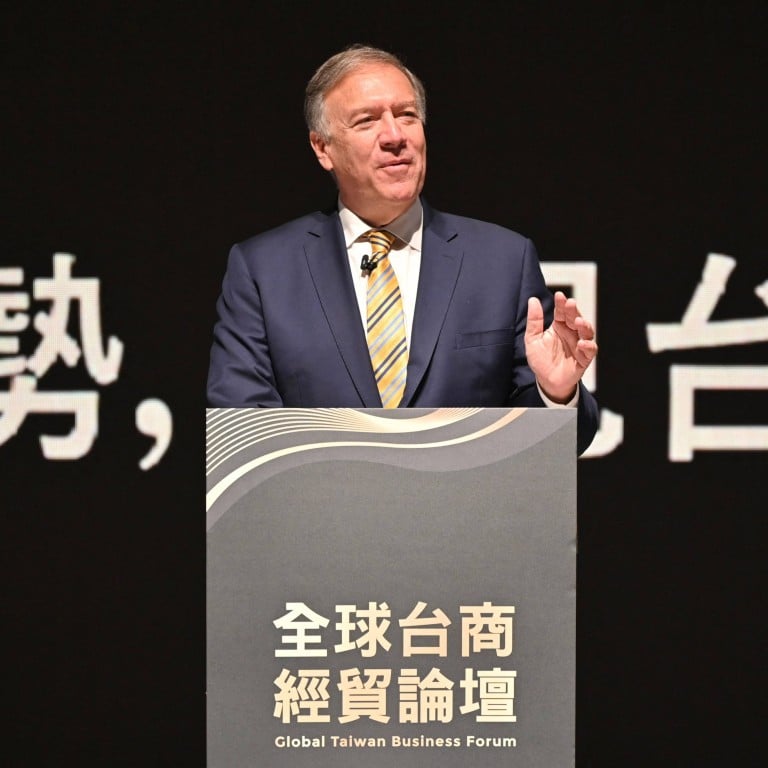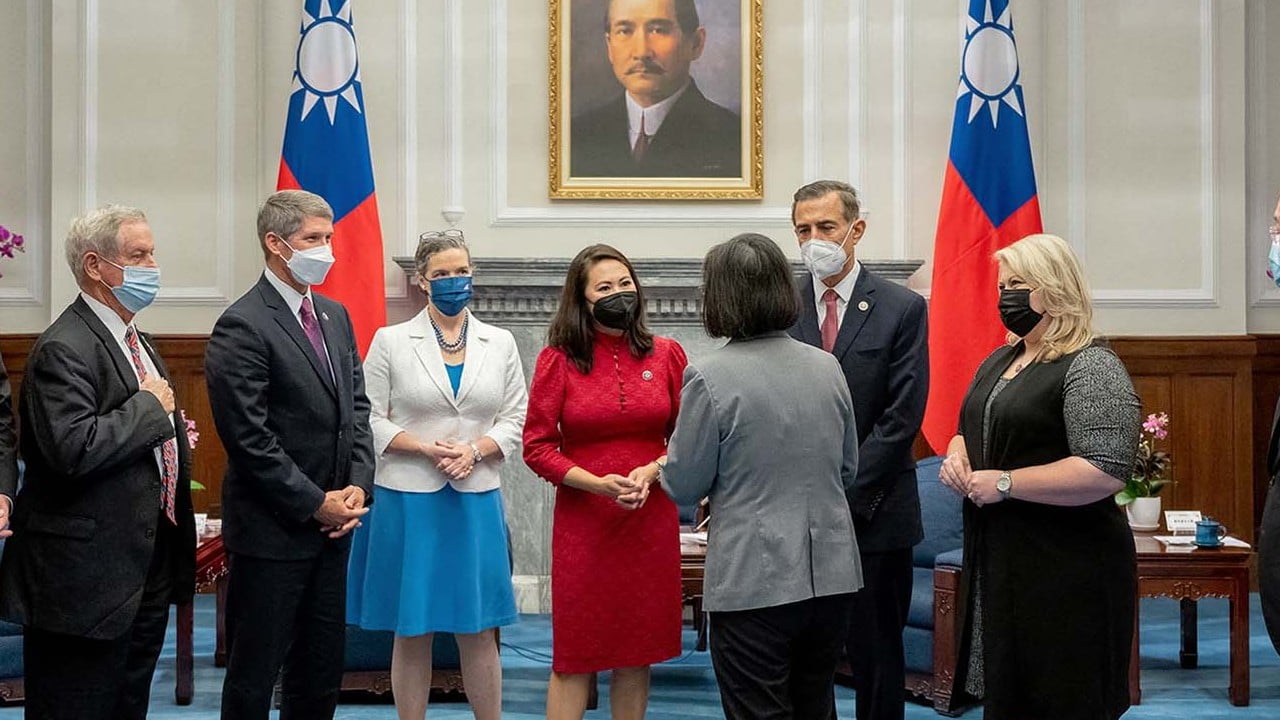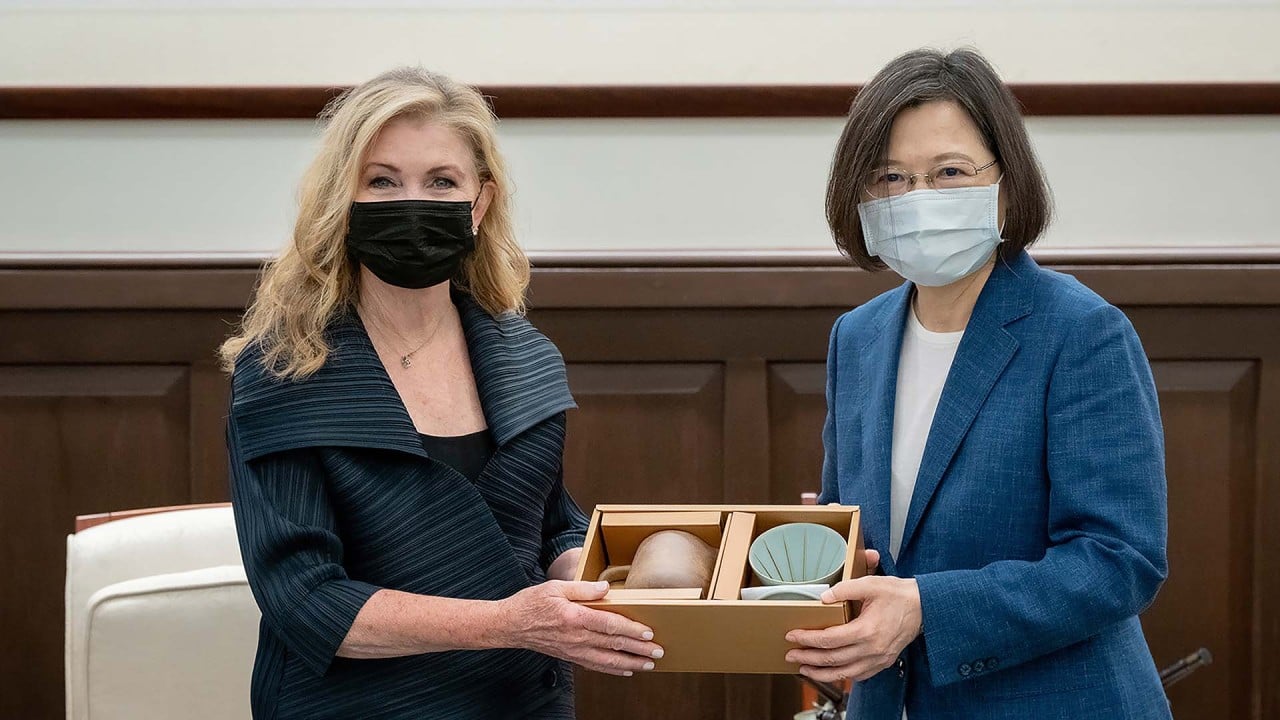
Pompeo in Taiwan calls for end to US ‘blind engagement’ with Beijing
- Former secretary of state says Washington must engage ‘realistically and on our terms’ to prevent Xi Jinping’s dream of a ‘Chinese century’
- He also criticised the Biden administration’s ‘confusing’ statements on strategic ambiguity policy, making it ‘even more ambiguous’
Pompeo also said he was “greatly concerned” about the repeated confusion caused by President Joe Biden over Washington’s stance in the event of an attack on the self-ruled island from the mainland.
“America must admit a hard truth … If we want a free 21st century, and not the Chinese century – the century which Xi Jinping dreams up – the old paradigm of blind engagement must end,” he said on Tuesday, in a speech at the first Global Business Forum in the southern city of Kaohsiung.
Pompeo, who arrived on the island on Monday night for a four-day business trip at the invitation of several local media and trade groups, said the US must instead choose to engage with Beijing “realistically and on our terms, the terms of freedom.”
This included a deeper and far more enthusiastic relationship with Taiwan, he said.
Pompeo said the US and other free nations should “pursue strategic decoupling with China”.
After decades of “naive engagement” with the mainland, Americans had recognised there was “nothing free nor fair” in doing business with Beijing. Hopes of political and economic security improvements from engaging with the mainland had not met even “the most minimal objective”, he said.
“Trade with China has been unlikely and will not be, in the near future, remotely free. Fair Trade for the world is impossible to achieve with countries that do not respect the rule of law, basic property rights, the capacity to enforce agreements.”
On ties between Washington and Taipei, Pompeo said “some people” claimed Taiwan was a part of the People’s Republic of China and were not pleased to see Americans coming to promote bonds with the island.
“I have a fundamentally different view, one which I’ve spoken of many times. It is the reality, the reality many of your past and present leaders have made clear. It is that Taiwan does not need to declare its independence because it is already an independent nation,” he said.
Pompeo said he was most proud of moving the US public and government closer to recognising “the simple political, diplomatic and sovereign reality” of Taiwan during his time as secretary of state.
“The fact is that no Americans who visit Taiwan and China would mistake either of these places for being the same country. One is free. One is not. One is an ally of the United States. The other is a repressive adversary,” he said.
“We recognised this basic fact in the Trump administration and started moving American policy towards a greater understanding and recognition of that.”
Pompeo is seen as a key architect of Washington’s hawkish stand towards Beijing during Donald Trump’s presidency, even changing US protocols on government contact with Taipei towards the end of his tenure, to allow formal exchanges between senior officials.
Most countries, including the US, do not recognise Taiwan as an independent state. Washington, however, opposes any attempt to take the island by force.
US officials walk back Biden’s remarks on Taiwan, say policy has not changed
In his speech, Pompeo criticised Biden’s “muddled and confusing statements” over the US policy of strategic ambiguity towards Taiwan – maintained since the late 1970s – on whether it would intervene militarily if the island is attacked.
Several times since taking office, Biden has suggested Washington would come to the island’s aid, only to be corrected by his officials that the policy has not changed.
For Pompeo, US policy has become “even more ambiguous” concerning America’s “true commitment to Taiwan”. “This concerns me greatly,” he said.
Is the US set to change policy of ambiguity on Taiwan?
Pompeo also criticised the Biden government’s Indo-Pacific Economic Framework, saying it was unclear to him if it would achieve anything other than diplomatic talks and “coffee and salons in the region”.
“When I look at the framework, I frankly don’t see a lot of economic potentials. I see the Biden administration foolishly sidelining its eighth biggest trading partner Taiwan, and they’re doing so for political reasons,” he said.
“This was … in spite of the fact that Taiwan made perfectly clear that it wants to be involved. I would also point out that India made it pretty clear that it will not participate in the trade portion of this framework. So there goes the Indo part of the Indo-Pacific framework.”
Pompeo is on his second trip to the island this year. A visit in March sharply provoked Beijing, which regards Taiwan as its territory that must eventually be brought under mainland control, by force if necessary.
Has US strategic ambiguous clarity on Taiwan sunk hopes for a Xi-Biden summit?
Meanwhile, a proposed bill that would sharply upgrade Taipei’s ties with Washington – almost to the level of an official ally – is unlikely to clear the US Congress in the current term.
The bill, approved by the Senate’s foreign relations committee on September 15, includes a promise to provide Taiwan with up to US$6.5 billion for arms purchases and to treat Taipei as a non-Nato ally.
Taipei’s semi-official Central News Agency quoted an unnamed senior Taiwanese official as saying the proposed Taiwan Policy Act would be unlikely to clear both the Senate and House before the congressional term ends on January 3.
Last week, US House Representative Brad Sherman also said it was unlikely the bill would clear the current Congress, but noted that some of its provisions could be included in the US National Defence Authorisation Act for fiscal 2023 – a congressional bill that authorises funding levels and provides key policy guidance for the military.



